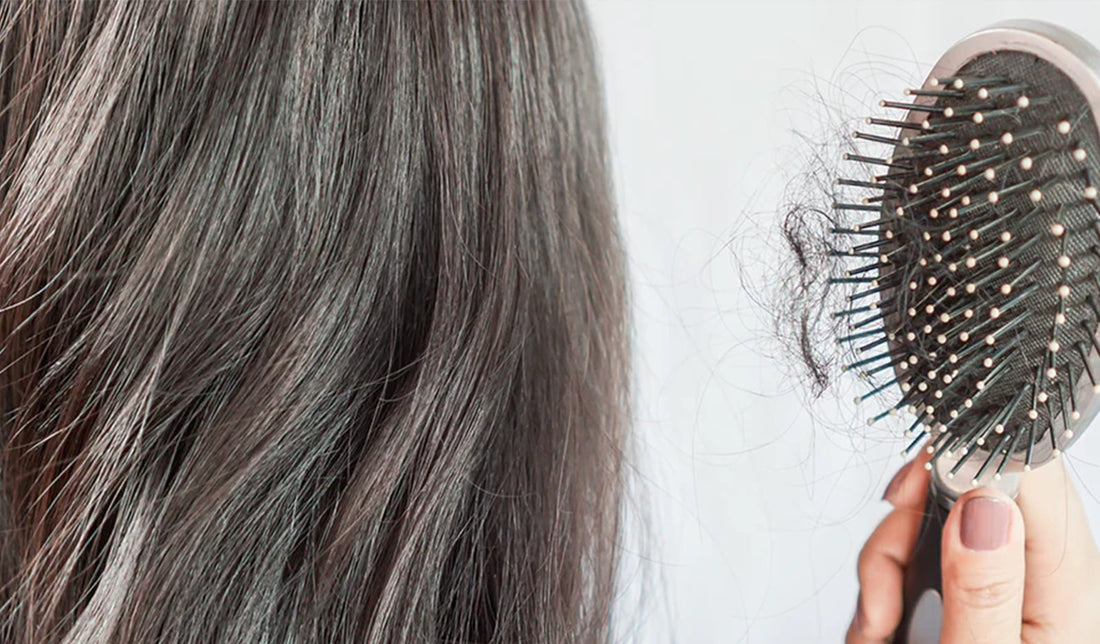
Caring for Your Scalp and Hair During Menopause
Share
Menopause. It's a whole new chapter. Your body's changing, and you're probably noticing it everywhere. One area in which you might not anticipate changes is your scalp and hair. You're not alone–about 60% of women experience noticeable differences like dryness, itching, and increased dandruff during this time. But don't worry, these changes are manageable with the right approach. Think of your scalp as an extension of your skin – it needs extra TLC during menopause.
Let's answer the central question:
Can Menopause Cause Dandruff?
Absolutely. Lower estrogen levels during menopause have a ripple effect throughout your body, including your scalp. Estrogen plays a vital role in maintaining healthy skin and hair. A decrease in estrogen often leads to a drier, itchier scalp. This dryness can cause flaking, and in some cases, it can contribute to the development of dandruff, a condition characterized by excess oil, flaking, and irritation.
Using Jupiter for Menopausal Scalp Care Issues
With a consistent, targeted care routine, you can keep your scalp comfortable and effectively manage dryness and dandruff.
For Dryness: Hydrate
Just as the rest of your skin needs moisture, so does your scalp. Our Moisture Renewal Trio is designed to deeply hydrate the scalp, easing irritation and preventing flakiness. Regularly using these products can help you maintain a healthy, comfortable scalp that feels good every day.
For Dandruff: CleanseAre you noticing larger, oily, yellow-ish flakes? That’s Dandruff. Our Balancing Shampoo and Restoring Serum are formulated to control dandruff with Zinc Pyrithione while being gentle on your scalp. These products soothe itching, reduce flakes, and refresh your scalp after every use.
Respect the Sensitivity
As the scalp becomes more sensitive during menopause, it's important to avoid products that contain harsh chemicals like sulfates and parabens. These chemicals can strip your scalp of natural oils, making it drier and more irritated. Instead, use gentle shampoos that cleanse your scalp without stripping away its natural moisture. Our entire product lineup is sulfate-free, paraben-free, and dermatologist-tested, ensuring that your scalp is cared for and free from unnecessary irritants.
Pamper Your Scalp
Regular scalp massages improve circulation, remove buildup, and enhance the absorption of scalp treatments. For an even more effective and relaxing experience, try our award-winning Scalp Brush with its gentle silicone bristles. It's like a mini spa treatment for your scalp.
Keep it Consistent
As with any skincare routine, consistency is crucial for long-term results. Make it easy on yourself (and your wallet) with a Jupiter subscription: 15% savings on every order, and its easy to modify, pause or cancel at any time.
Frequently Asked Questions About Scalp and Hair Care During Menopause
Why is my hair thinning during menopause?
The reduction in estrogen during menopause affects your scalp's health, which in turn impacts hair growth. This hormonal shift can lead to a drier, less nourished scalp environment, potentially shrinking hair follicles and causing thinning, particularly around the crown and hairline. By focusing on scalp care with products designed to balance and nourish your scalp, you can create a healthier foundation for hair growth, potentially mitigating some of these effects.
Does menopause affect hair texture?
Yes, some women experience changes in hair texture during menopause, often due to changes in their scalp's condition. A drier, more sensitive scalp can make hair more brittle, frizzy, or coarse. The key to addressing these texture changes lies in nurturing your scalp. Using scalp-focused products like leave-in treatments and hydrating masks can help restore balance to your scalp, leading to improved hair texture and maintaining softness from the root. By prioritizing scalp health, you're not just treating the symptoms but addressing the root cause of these texture changes.
Are there any lifestyle changes that can help with scalp health during menopause?
Maintaining a balanced diet rich in vitamins and minerals, staying hydrated, managing stress through practices like yoga or meditation, and getting adequate sleep can all positively impact your scalp and hair health during menopause.
Is dandruff a side effect of menopause?
Yes, like we said above, dandruff can be a side effect of menopause, as hormonal fluctuations affect the scalp's ability to retain moisture and balance oil production. This often leads to dryness and flaking.
Jupiter is Your Partner in Menopausal Scalp Care
Menopause is a deeply personal and often challenging time. While we can't alleviate all the changes you might experience, at Jupiter, we believe in the power of taking control where you can. Managing your scalp health is one way to do just that. And as always, we're here every step of the way, providing you with the support and products you need to maintain a healthy, thriving scalp throughout this life transition.


